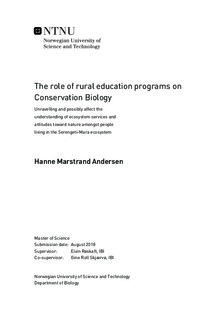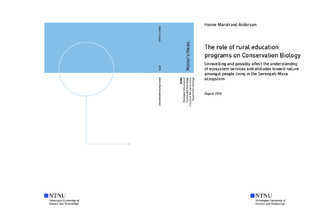| dc.description.abstract | Today, human-induced impacts like climate change, human population growth and land use change are negatively affecting the biodiversity and ecosystems, which are important for human well-being. Africa is amongst the places hit hardest. In addition, many of the worlds poorest live on this continent, making many of the people here extra vulnerable to these impacts.
This study aimed to see if a four-day education program about biodiversity, ecosystem services and threats to nature would give the participants better understanding about and affect their attitudes towards nature. 300 adults (eighteen years or above) from ten different villages in five different districts surrounding the Serengeti-Mara ecosystem participated in the program. The exact same questionnaire were given out the first day (pre-test) and the last day (post-test) to find out what knowledge and attitudes the participants had from before, and whether these changed during the program. The results indicate that the participants got a better understanding of ecosystem services and threats and possible consequences from these to nature. The results also indicated alterations in attitudes towards nature. Analyses indicate that difference between the pre-test and the post-test was the most important explanatory factor. In addition, education level and districts also affected much of the responses. However, the pre-test revealed that the participants possessed both knowledge about and positive attitudes towards nature before the education attending the program.
I conclude that the participants gained more understanding about ecosystem services and threats to nature during the education program. However, compared to similar studies on school children, the results in this study was not as clear, indicating that the adult participants gained less knowledge from this education program than thechildren. Still, as the challenges mentioned initially happens now, I mean that it is important to include the adults when it comes to knowledge about conservation biology and restoring the natural resources and ecosystem services, but possibly by education programs focusing more on what actions can be taken, rather than a theoretic focus. possibly through similar education programs. However, the programs should possibly be more action-based than theory-based, as was the case for this study. | |

